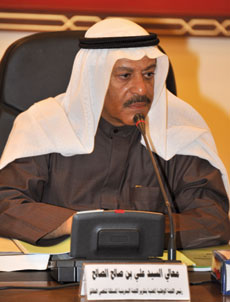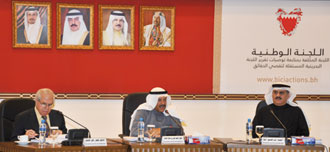
|
 |
 |
|
|
|
|
|
|
|
|
|
|
|
|
|
|
|
|
|
|
|
|
|
|
The BHRM Interviews the President of the National CommitteeRecommendations are Being Swiftly Implemented,
|
 |
The National Committee, since its establishment on 26 November 2011, has given particular attention to the issue of national reconciliation, as it believes in the importance of swift action to reunite Bahraini society. The Committee has taken preliminary steps by forming a team of committee members who deal directly with Bassiouni’s recommendations, especially those related to the national reconciliation such as (1724 and 1725).
According to these two recommendations on media and education, the Committee believes that media and education institutions in the Kingdom are important partners in achieving national reconciliation. The Committee thus presented the Government with many suggestions to push forward the implementation of these two recommendations. This includes putting forward a media strategy to promote national values, hastening procedures for bills on publishing and press regulations, and presenting educational programs at primary, secondary and university levels to encourage religious and political tolerance, and promote human rights and the rule of law.
The Committee also called upon the Government to put forward a program for national reconciliation which addresses political, social and economic aspects in accordance with human rights principles and the constitution, and to benefit from international expertise. The Committee also believes that the implementation process is going as planned, especially with the support of executive procedures from the Ministry of Education and the Authority of Information Affairs.
One of the most important steps which would accelerate national reconciliation is to remedy the families of the dead, victims of torture and those who were subjected to ill treatment or solitary confinement. On 22 September 2011, his Majesty the King issued Royal Decree No.30 for the year 2011, in order to set up a compensation fund, and a subsequent Decree No.13 regarding the establishment of an administration committee for this fund.
The issue of places of worship is an extremely sensitive one, both inside and outside Bahrain. The Government has vowed to solve the problem but it is now your Committee’s responsibility to implement this promise. What are the practical steps undertaken in this regard?
The President of the Committee is directly following up recommendation no (1723) with the Government, which includes the rebuilding of places of worship. His Majesty the King issued several directives regarding the reconstruction of some places of worship at the Government’s expense, and it has already begun executing these guidelines by establishing a committee to study the rebuilding of religious sites. On 12 January 2012, the Government announced the rebuilding of 12 mosques (reconstruction works on five of them is already in progress), while the restoration of seven others will take place in the near future. The study of the status of other sites is continuing in order to undertake the necessary official and legal procedures. The Ministry of Justice and Islamic Affairs, and in coordination with all concerned ministries, including the Ja’fari Awqaf, is following reconstruction efforts of these religious sights in accordance to Bahrain’s laws and regulations.
 |
With regards to the reinstatement of workers in both private and public sectors, has the situation been resolved? How accurate are claims that there are preconditions for those who wish to be reinstated?
The issue of the reinstatement of workers lies within the context of recommendation no. 1723. As I mentioned previously, the President of the Committee is appointed to directly follow developments in this issue and we have noticed that the Government is serious in dealing quickly with this file. The vast majority of workers in both sectors have already been reinstated as well as university students. According to the detailed statistics received from the Ministry of Labour, the majority of employees in the public and private sector who were dismissed as a result of practising their right to freedom of expression have been reinstated or are in the process of being reinstated.
It is noteworthy that during his visit in February 2012 the President of the fact-finding Committee Professor Mahmoud Sharif Bassiouni highlighted the Government’s achievements in this regard. However, it remains important that all employers’ efforts should be directed towards solving disagreements which were a result of the recent unrest in Bahrain during February and March 2011. This would promote positive relations and serve the mutual interests of the whole community.
To what extent do you believe that your Committee’s achievements paved the way towards re-building trust between the various components of Bahraini society, as well as the Government and the Opposition?
The main task of the Committee is to follow-up the implementation of Bassiouni’s recommendations, specified by BICI’s report and His Majesty’s Royal Decree. The work of the Committee is for the benefit of all Bahrainis and its results will hopefully bring good to all. All the proposals which we have presented to the Government guarantee the full implementation of Bassiouni’s recommendations, in order to prevent the re-occurrence of past events. This is also the same objective of the political leadership, when in an unprecedented step it ordered the establishment of the Committee, and accepted the outcome of its report.
The National Committee has called upon all political parties to contribute to the work of the Committee, and we were very keen to get them involved in the decision-making process by inviting them to participate with their ideas and opinions. This invitation remains open.
The importance of implementing the recommendations on the ground was expressed by his Majesty the King as soon as the recommendations were issued, and the Government is exerting all efforts in this regard. So far the government has shown full cooperation. Furthermore, implementation of the recommendations has been swift, and what has been achieved is more than what remains to be addressed. This was in fact stressed by BICI’s President himself during his recent visit to Bahrain, when he commented that the Government of the Kingdom of Bahrain, and based on guidance of his Majesty the King, is responding well to the BICI report.
However, it is true that the effects of some steps need time to be felt, such as amendments to laws and legislations. But in general, the work of the National Committee is running smoothly, and we expect that we will be able to lay the foundations for a safe return to normality, in order to continue reform and development in the country.
With regards to compensating those affected by recent events and the issuing of two royal decrees, what is your Committee’s achievement in this regard?
As I mentioned earlier, we view this issue as crucial for achieving national reconciliation. The National Committee presented a number of proposals to the Government which it believes will accelerate compensation procedures. These proposals have been put into practice by the Government, including allocating courts for compensation claims and establishing a committee in the Ministry of Justice and Islamic affairs for the purpose of dealing with claims outside the courts. Those benefiting from the proposals include the families of the deceased and those injured last year, or anyone claiming compensation from the Government.
